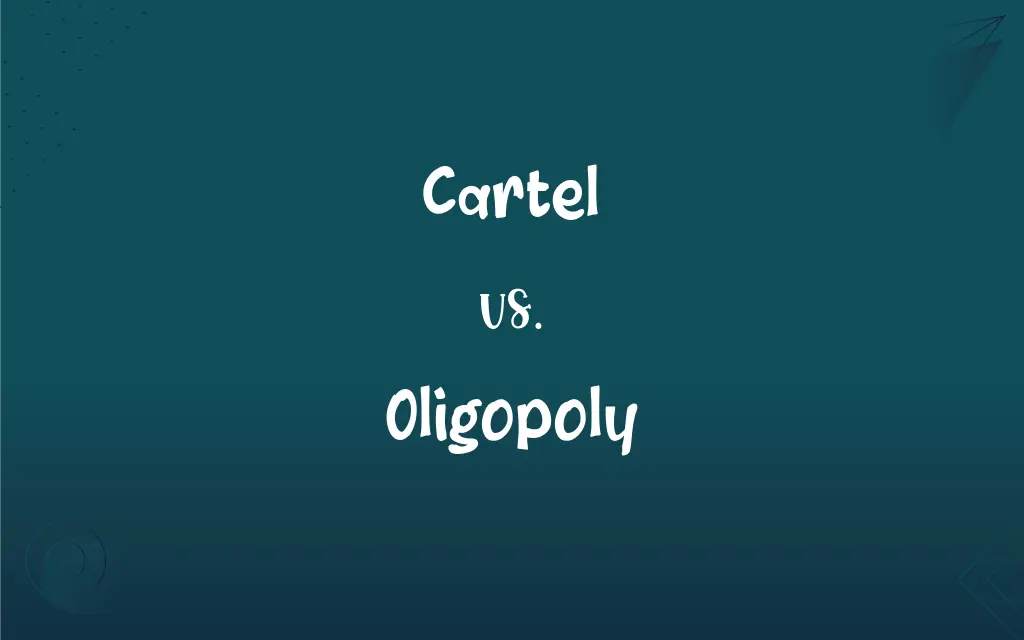Cartel vs. Oligopoly: What's the Difference?
Edited by Aimie Carlson || By Harlon Moss || Published on January 9, 2024
A cartel is a formal agreement among competitors to control prices or markets, while an oligopoly is a market structure with a few dominant firms, often leading to limited competition.

Key Differences
A cartel involves companies explicitly agreeing to cooperate on pricing, production, or market sharing, often illegally. In contrast, an oligopoly is a market structure where a few companies dominate the market, which may or may not involve explicit cooperation.
Cartels are typically formed to maximize profits through price fixing, reducing production costs, or controlling markets. Oligopolies naturally emerge in markets where barriers to entry are high, leading to a concentration of market power among a few firms.
In a cartel, member companies lose some independence in decision-making to abide by the agreement. An oligopoly allows individual firms to act independently, though their decisions can be heavily influenced by the actions of the other few competitors.
Cartels are often illegal and pursued by regulatory authorities due to their anti-competitive nature. Oligopolies, however, are legal but monitored, as they can lead to competitive practices similar to cartels.
The impact of a cartel is usually higher prices and reduced competition. In an oligopoly, while competition is limited, firms can still compete on factors other than price, such as innovation or service quality.
ADVERTISEMENT
Comparison Chart
Definition
Formal agreement among firms to control prices or markets
Market structure with few dominant firms
Legality
Often illegal
Legal, but monitored
Competition
Explicitly limits competition
Competition exists but is limited
Company Independence
Reduced, due to agreements
Maintained, but influenced by competitors
Impact on Prices and Market
Usually leads to higher prices
Prices can be competitive, but are influenced by few firms
ADVERTISEMENT
Cartel and Oligopoly Definitions
Cartel
A cartel is an agreement between businesses to control prices or limit competition.
The government prosecuted the oil companies for forming a cartel.
Oligopoly
An oligopoly is a situation where few companies control the majority of the market.
High entry barriers in the aviation industry have created an oligopoly.
Cartel
A cartel is an alliance of companies for mutual benefit, often illegally.
A cartel in the diamond industry fixed prices globally.
Oligopoly
An oligopoly is a market dominated by a small number of large firms.
The telecommunications industry operates as an oligopoly.
Cartel
A cartel is a group of firms collaborating to manipulate market conditions.
The cartel's control over the market led to increased prices.
Oligopoly
An oligopoly is a market structure with a few firms dominating the industry.
The automotive sector is an example of an oligopoly.
Cartel
A cartel is a formal organization of producers to regulate production and prices.
The cartel members agreed to reduce production to raise prices.
Oligopoly
An oligopoly is a market condition where few companies have significant market power.
In an oligopoly, major players heavily influence prices.
Cartel
A cartel is a coalition of independent businesses to limit competition.
The cartel was fined for anti-competitive practices.
Oligopoly
An oligopoly is a market form where a market or industry is controlled by a small number of firms.
Oligopoly leads to less competition in the market.
Cartel
A combination of independent business organizations formed to regulate production, pricing, and marketing of goods by the members.
Oligopoly
A market condition in which sellers are so few that the actions of any one of them will materially affect price and have a measurable impact on competitors.
Cartel
An official agreement between governments at war, especially one concerning the exchange of prisoners.
Oligopoly
An economic condition in which a small number of sellers exert control over the market of a commodity.
Oligopoly
(economics) a market in which control over the supply of a commodity is in the hands of a small number of producers and each one can influence prices and affect competitors
FAQs
Are cartels legal?
In most countries, cartels are illegal due to their anti-competitive nature.
How do cartels form?
They form when businesses agree to coordinate instead of competing.
What's an example of a cartel?
OPEC, controlling oil production and prices, is a well-known example.
Do cartels always involve illegal activities?
Not necessarily, but they often engage in practices that violate antitrust laws.
How do cartels affect consumers?
They often lead to higher prices and reduced choices for consumers.
What is a cartel?
A cartel is a formal agreement among competing firms to control prices, production, and market distribution.
Can cartels be global?
Yes, cartels can operate internationally, affecting global markets.
How long do cartels usually last?
They can last for various durations, but often collapse due to internal competition or legal actions.
What is an oligopoly?
An oligopoly is a market structure where a few firms dominate the market.
What is the purpose of a cartel?
The main purpose is to increase members' profits by controlling the market.
What's an example of an oligopoly?
The automotive industry, with a few major car manufacturers, is a typical example.
How does oligopoly affect prices?
Firms in an oligopoly often keep prices stable to avoid costly price wars.
Are oligopolies regulated?
Yes, governments often regulate oligopolies to prevent anti-competitive practices.
Can new companies enter an oligopoly?
Entry is difficult due to high barriers, like significant capital requirements.
How are cartels detected?
They're often detected through investigations by regulatory authorities.
How do oligopolies compete?
They often compete through marketing, product differentiation, and customer service rather than price.
Is oligopoly the same as monopoly?
No, a monopoly is controlled by one firm, while an oligopoly has multiple dominant firms.
Can oligopolies be beneficial?
They can lead to economies of scale and stability in certain markets.
How do oligopolies form?
They form naturally when a few firms gain a large market share, often through innovation or consolidation.
How do oligopolies impact innovation?
They can both encourage and stifle innovation, depending on the market dynamics.
About Author
Written by
Harlon MossHarlon is a seasoned quality moderator and accomplished content writer for Difference Wiki. An alumnus of the prestigious University of California, he earned his degree in Computer Science. Leveraging his academic background, Harlon brings a meticulous and informed perspective to his work, ensuring content accuracy and excellence.
Edited by
Aimie CarlsonAimie Carlson, holding a master's degree in English literature, is a fervent English language enthusiast. She lends her writing talents to Difference Wiki, a prominent website that specializes in comparisons, offering readers insightful analyses that both captivate and inform.






































































